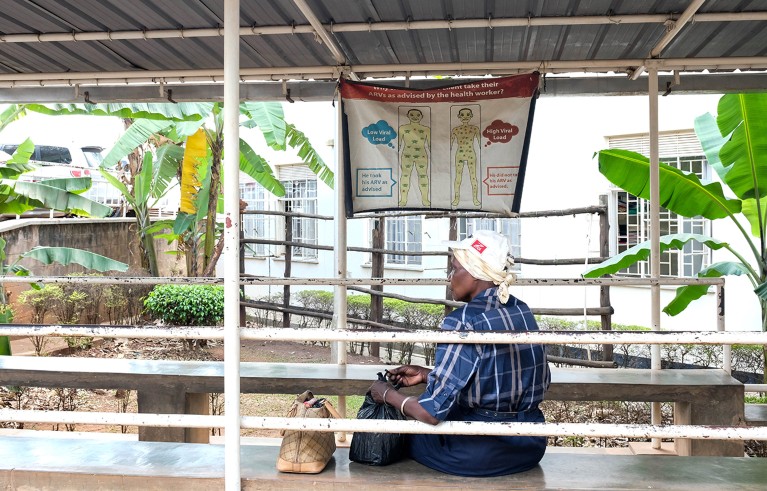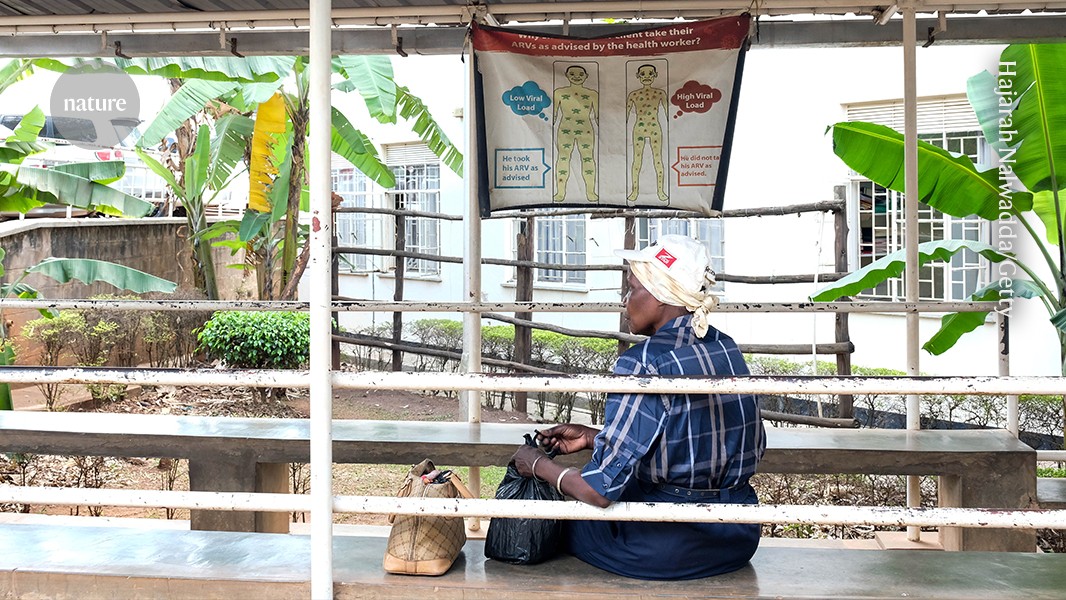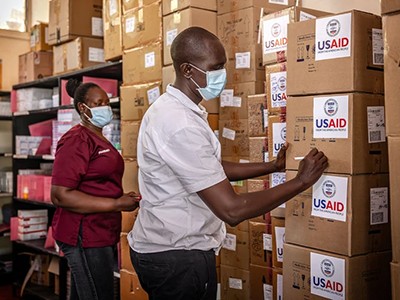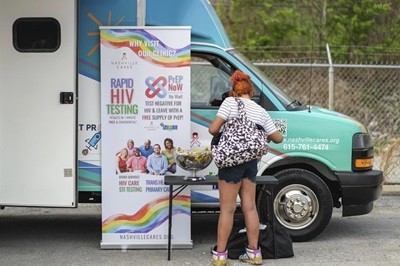
A US-funded group offering AIDS support in Kampala now faces uncertainty.Credit: Hajarah Nalwadda/Getty
On the first day of his second term, US President Donald Trump issued an executive order to freeze nearly all foreign aid, pending a 90-day review — a period that has now been extended until 20 May. The US Agency for International Development (USAID), the world’s largest single aid donor, was dissolved. In 2024, it distributed some US$44 billion for disaster recovery and long-term projects, from growing free markets to treating and preventing diseases.
USAID was the main US agency responsible for implementing the world’s largest programme providing life-saving diagnostics, preventive care and treatment for HIV/AIDS. Its dissolution has put an initiative known as the US President’s Emergency Plan for AIDS Relief (PEPFAR) in peril. USAID is also the largest funder of the United Nations HIV/AIDS agency UNAIDS, based in Geneva, Switzerland. UNAIDS has had its agreement with USAID terminated and its staff are presently on a stop-work order.
Trump blew up the global fight against AIDS. Can it recover?
As we report in a News Feature this week, swift and severe cuts to PEPFAR funding have created chaos and confusion in a programme widely praised for its effectiveness. Thanks in large part to PEPFAR, the world was on a path to reducing, by 2030, the number of new HIV infections and AIDS-associated deaths by 90% compared with 2010 levels. It was because of PEPFAR that some 228,000 people were being tested for HIV/AIDS every day.
All of this is now in jeopardy. Although a waiver to the White House executive order says that life-saving interventions can continue, the reality on the ground tells a different story. According to one assessment published in February, more than 50 organizations across 16 countries have shut down their HIV/AIDS services1. They are unable to pay staff, who have been laid off.
The US government must urgently provide clarity about PEPFAR’s future — each extra day of uncertainty will make it harder to repair the immense damage already wrought. Without PEPFAR, 26 million more people could become infected with HIV by 2030. Stopping the programme now would consign millions to a death sentence2. “We’re almost at the end of AIDS, and that can be accomplished in the next four or five years. Let’s not step away, let’s step in and finish what we promised we would do,” says UNAIDS deputy executive director Angeli Achrekar.
25 million deaths: what could happen if the US ends global health funding
Launched in 2003 by former US president George W. Bush, PEPFAR has financed 70% of the world’s HIV response, saving more than 26 million lives and enabling nearly 8 million babies to be born HIV-free3. Today, some 20 million people with HIV/AIDS rely on PEPFAR funds for treatment.
The sudden freeze threatens not only funding, but also the stability of HIV/AIDS programmes in countries that relied on PEPFAR. In the Democratic Republic of the Congo, Haiti, Mozambique, Tanzania and Zambia, more than half of HIV drugs are bought with PEPFAR money. These funds are also used to train health-care workers and nurses to provide HIV testing, treatment, counselling and medical care, sometimes in clinics where they are the only staff members available to dispense medications. PEPFAR money has helped to keep clinics stocked with antiviral drugs and testing kits and, in sub-Saharan Africa, enabled care to be provided for 13 million orphans and families affected by HIV, and protected more than 10 million girls from sexual abuse3.
Trump team guts AIDS-eradication programme and slashes HIV research grants
Women with HIV have a higher risk of cervical cancer than other women do, and PEPFAR funds provide them with access to screening services. These community-based HIV-prevention and outreach programmes provide ways to prevent HIV and help infected people to stay on treatment. PEPFAR’s freeze has also disrupted monitoring systems that track how HIV spreads, which treatments are working and where the greatest needs are. Disrupting these data systems jeopardizes the research pipeline that enables the development of therapeutics, from antiviral drugs to preventive treatments, such as vaccines.
Critics of aid programmes say that aid should both assist nations with their immediate needs and support them to become self-sufficient. PEPFAR does so by establishing improvement plans together with recipient countries.
The George W. Bush Institute, a think tank based in Dallas, Texas, is right to say that the US Congress needs to authorize PEPFAR for another five years, so that the programme can complete its mission and so that countries, organizations and funders can plan for the transition to a world without USAID by strengthening local health systems, investing in primary care and establishing local medicine supply chains.
The United States cannot be expected to indefinitely shoulder the burden of ending HIV/AIDS, but suddenly withdrawing life-saving interventions is simply unconscionable. In the world of international aid, PEPFAR is well respected and was seen as being on the path to success. It should be allowed to complete its task.





